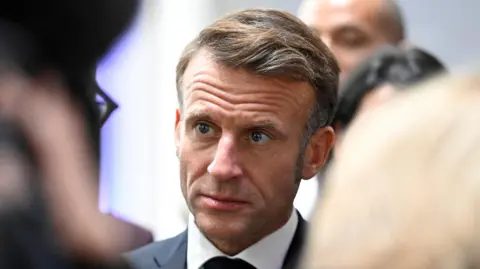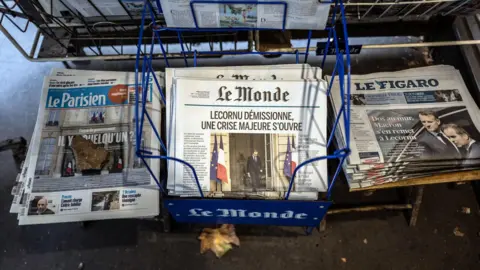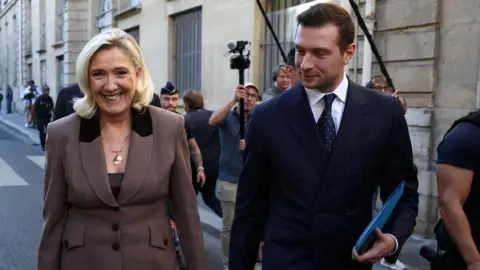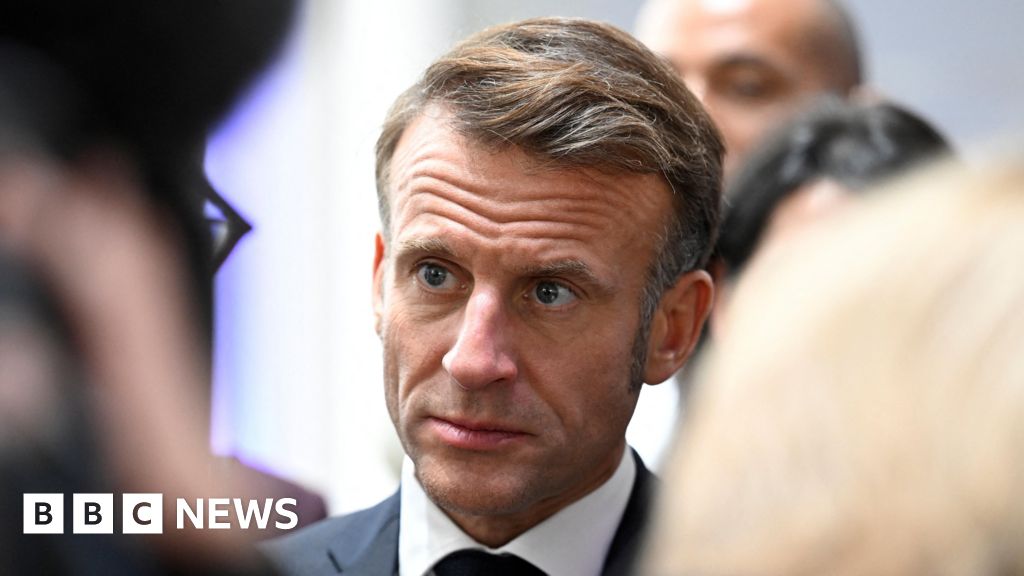Paul KirbyEurope digital editor and
Laura Gozzi
 Reuters
ReutersAfter eight years in office, Emmanuel Macron’s position as president is coming under increasing pressure as France’s political crisis escalates.
Macron once called himself maître des horloges – master of the clocks – but his command of timing is not what it was. For the third time in a year his choice of prime minister has resigned, and opinion polls suggest almost three-quarters of voters think the president should step down too.
Long-time ally Édouard Philippe, who served as Macron’s first prime minister from 2017-20, has urged him to appoint a technocrat prime minister and call presidential elections in an “orderly manner”.
But Macron is more likely to dissolve parliament than step down.
How did we get here?
Prime Minister Sébastien Lecornu announced his resignation at the start of a day of political drama on Monday, after only 26 days in the job.
Hours later he said he had accepted Macron’s request to stay on for another 48 hours to hold last-ditch talks with political parties “for the stability of the country”.
The unexpected twists were the latest in a long series of upheavals that began with Emmanuel Macron’s decision to call a snap parliamentary election in June 2024. The result was a hung parliament in which Macron’s centrist partners lost their majority and had to seek alliances with other parties.
The leader of one of those parties, Bruno Retailleau of the conservative Republicans, pulled out of Lecornu’s government 14 hours after it was announced.
 EPA
EPAOpinion polls suggest almost three-quarters of voters think Macron should step down
It’s all about France’s debt
The big challenge facing Lecornu and his two predecessors has been how to tackle France’s crippling national debt and get over the ideological divisions between the centre-ground parties who could be part of a government.
Early this year public debt stood at €3,345 billion, or almost 114% of economic output (GDP), the third highest in the eurozone after Greece and Italy. France’s budget deficit this year is projected to hit 5.4% of GDP.
Michel Barnier and François Bayrou lasted only three and nine months respectively before being ousted in confidence votes as they tried to tackle the deficit with austerity budgets.
Lecornu did not even make it as far as presenting a budget plan. Criticism poured in from all sides as soon as he presented his cabinet on Sunday afternoon and by Monday morning he had decided his position was untenable.
He blamed his departure on the unmovable stance of parties who, he said, “all behave as if they had a majority”.
All the parties have an eye on the next presidential votes in 2027, and they are also gearing up for the possibility of snap parliamentary elections in case Macron dissolves parliament again.
Who are the key figures in this crisis?
The leaders who have been calling on Macron to resign for months are on the hard right and radical left.
Marine Le Pen and her young lieutenant in the far-right National Rally, Jordan Bardella, are ready for elections and have refused Lecornu’s invitation to talk.
Jean-Luc Mélenchon of the radical left France Unbowed (LFI) has been agitating for Macron’s impeachment, although that seems unlikely. He is backed by the Greens.
Olivier Faure’s centre-left Socialists were allied to the radical left during the last elections but have been talking to Lecornu on condition that he forms a left-wing government.
Then there is Gabriel Attal, who leads Macron’s own centrist Renaissance party, but has said he no longer understands the president’s decisions.
And on the centre-right is Bruno Retailleau, whose Republicans have been part of the so-called socle commun (common platform) with the centrists.
 Reuters
ReutersA snap election would benefit Marine Le Pen’s hard-right National Rally in particular
What happens now?
Lecornu has been deep in discussions with party representatives and has until Wednesday evening to present a “platform of action and stability” to Macron.
There are four options – and none of them look good.
Has Macron run out of road?
After his third prime minister in the past year announced his resignation on Monday, Macron went for a long walk along the River Seine, his mobile phone to his ear.
A stunt for the cameras? Perhaps, but it was symbolic of the solitary nature of his position, as he confronts some of the hardest choices of his presidency and some of his former allies appear to be deserting him.
But the president will have known for some time of the political challenges ahead and he is not one to give up without a fight – or another bid to stabilise an increasingly ungovernable France. There is a sense that time may be running out for the master of the clocks.

